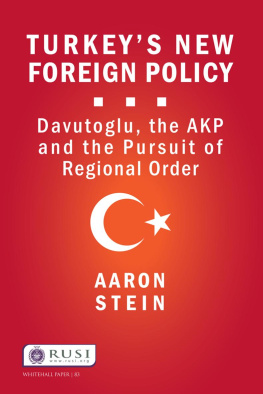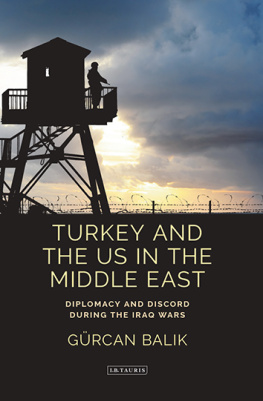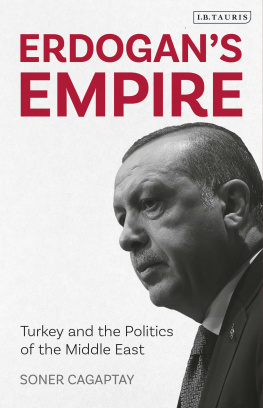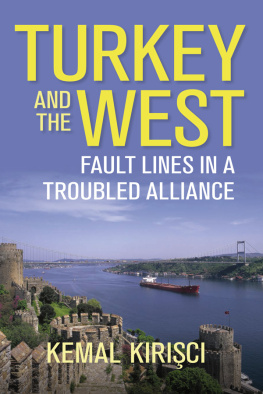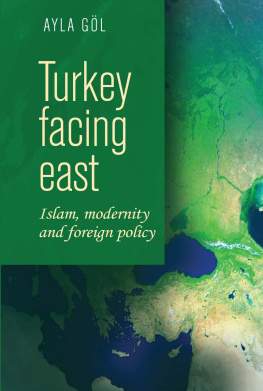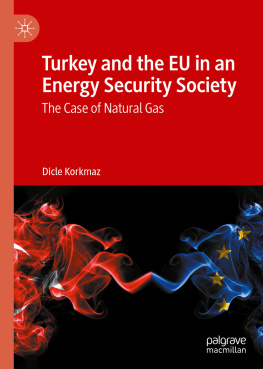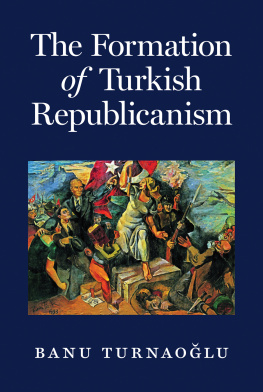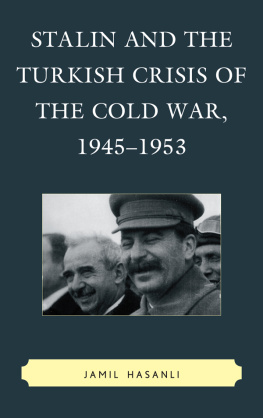
aban Halis al is Professor of International Relations at Seluk University, Turkey. He received his PhD from the University of Nottingham and was Vice-President of the Turkish Higher Education Council between 2011 and 2015. In addition to many papers, essays and articles in Turkish and English, he is also the author of numerous books in Turkish. He frequently appears on television and radio as a commentator, and writes occasionally for daily newspapers.
The book goes beyond a classical security-centric account and embraces, to some degree, a constructivist perspective with its emphasis on ideational and societal factors in the making of Turkish foreign policy Based on solid and original research, and the author skilfully displays this throughout the text.
Gkhan etinsaya, Professor of International Relations, Istanbul ehir University
This book differs from the other works examining Turkey and her alignment with the Western world during the Cold War years by the depth of its analytical approach combining the systemic-level variables with ideational ones, namely identity, ideology and security culture al comprehensively explains all of the paradoxical developments that deeply affected Turkey's internal and external relations during the Cold War years.
A. Nuri Yurdusev, Member & Vice President, Turkish Academy of Sciences and Professor of International Relations, Middle East Technical University, Ankara
Contemporary Turkey, published in collaboration with the British Institute at Ankara
Series editor: Glnur Aybet, Professor and Head of the Department of Political Science and International Relations, Baheehir University, Istanbul
New and forthcoming titles:
Turkey and the Politics of National Identity: Social, Economic and Cultural Transformation, edited by Shane Brennan and Marc Herzog
Turkey and the US in the Middle East: Diplomacy and Discord during the Iraq Wars, by G?rcan Balik
Turkey's Cold War: Foreign Policy and Western Alignment in the Modern Republic, by aban Halis al?
As our understanding of modern Turkish history continues to evolve, and as the Middle East continues to change, a new generation of scholars are exploring questions of identities, class, politics, diplomacy and religion. The British Institute at Ankara (BIAA) is internationally renowned for its support of new independent academic research in the region across various fields, including archaeology, ancient and modern history, heritage management, social sciences and contemporary issues in public policy, and political sciences. Contemporary Turkey is a collection of specially commissioned books published in a collaboration between I.B.Tauris and the BIAA, which focus on the identity, history and politics of republican and modern Turkey. Authors and contributors combine academic rigour and scholarship with extensive first-hand experience in the region.
TURKEY'S COLD
WAR
Foreign Policy and Western Alignment in the Modern Republic
ABAN H ALS ALI
Published in association with the British Institute of
Archaeology at Ankara (BIAA)
To My Wife, Habibe, With Love
Published in 2017 by
I.B.Tauris & Co. Ltd
London New York
www.ibtauris.com
Copyright 2017 aban Halis al
The right of aban Halis al to be identified as the author of this work has been asserted by the author in accordance with the Copyright, Designs and Patents Act 1988.
All rights reserved. Except for brief quotations in a review, this book, or any part thereof, may not be reproduced, stored in or introduced into a retrieval system, or transmitted, in any form or by any means, electronic, mechanical, photocopying, recording or otherwise, without the prior written permission of the publisher.
Every attempt has been made to gain permission for the use of the images in this book. Any omissions will be rectified in future editions.
References to websites were correct at the time of writing.
Contemporary Turkey 2
ISBN: 978 1 78453 189 8
eISBN: 978 1 78672 107 5
ePDF: 978 1 78673 107 4
A full CIP record for this book is available from the British Library
A full CIP record is available from the Library of Congress
Library of Congress Catalog Card Number: available
PREFACE AND ACKNOWLEDGEMENTS
This book is a product of almost 25 years of research, writing and teaching of international relations theory in general and modern Turkish foreign policy in particular. Therefore, this book contains some aspects of my academic work, and includes some parts of my PhD thesis, course notes and articles. Of course, I have spent much time updating, revising, restructuring and even rewriting them completely in order to enable them to be published in book format. Where I have referred to them, they are referenced in the endnotes, and included in the bibliography.
I would like to say many thanks to my editors, supervisors, external examiners, colleagues, research assistants, students, publishers and friends who have made unforgettable contributions to this book. I wish to express my thanks to Dr William Hale, Dr Richard Aldrich, Dr Simon Tormey, Mr Chris Farrands and Prof. Dr Glnur Aybet for their supervision, reading, critics, advice and guidance. They were all helpful, but to Prof. Aybet, I am also very much indebted for her generosity with time, interest and friendship as the editor of the book. Without her support and patience, this book would not have been published. Dr Vanessa Tinker and Mehmet Ege Eren deserve many thanks for their understanding, criticism and help in improving many parts of the book. For copy-editing, I would like to thank Nick James for his expertise and strong interventions that made this publication much more readable. In the hot summer days of July when all the indexers were busy, Engin Klarslan helped me in organising a wonderful index within a very short time, and deserves many thanks. Also, I wish to mention my commissioning editor Thomas Stottor from I.B.Tauris, and to thank him for his patience, suggestions and vital interventions to develop and expose some hidden points of the book, and for chasing me with great insistence. I also thank Sara Magness as the Production Editor for her advice, planning, and overseeing of the proofreading and publication of the book with great interest.
Since the list of people and institutions is quite lengthy, I cannot mention everyone who deserves my thanks, but the Turkish Ministry of Education must be mentioned here for my scholarship and their financial support during my study in England, and the BIAA for sponsorship of the publication of the book. I will never forget that, without their help, most probably this book would have had to wait another 25 years. Therefore, I am very grateful to all of them.
Last but by no means least, I would like to thank my wife, Habibe, and my children Aye Sena, mer Faruk, Ahmet Cahit and Bilal Can, who have been patient, tolerant and helpful throughout my studies.
None of them are of course responsible for any mistakes in this book, for which I take full responsibility.
INTRODUCTION
Kemalist Turkey benefited from the Cold War much more than any other country. The Turks loved it because it provided them with many opportunities, including an international system that allowed Turkey to realise its long-term aspirations for becoming a Western country. Mainly because of the Cold War between Eastern and Western powers, which brought countries on either side together in opposing camps, Turkey joined NATO and the Council of Europe, and was associated with the European Union, despite some problems. In addition, the Turks found a robust shelter under the umbrella of the West against the Russians, who had been the mightiest enemy at their borders for centuries. In fact, nothing much had changed in this respect since the end of the sixteenth century. But during the Cold War period Turkey felt comfortable in foreign policy-making as well, since it became part of the Western bloc, and the Cold War system accordingly offered the country a simple general policy framework to follow in international politics. Therefore, when the events leading to the end of the Cold War started in the late 1980s, many people in Turkey began worrying about the future of their country in the context of the newly emerging international system.


